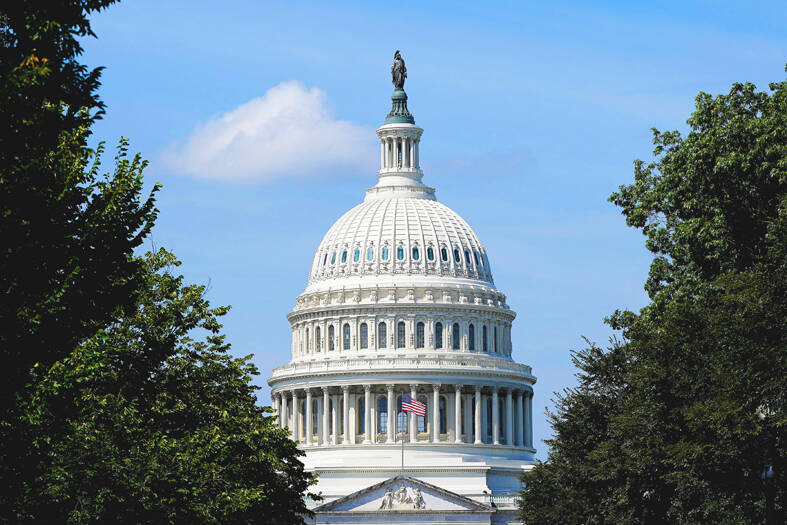A bill, known as the “Defund China’s Allies Act,” has been introduced in the US House of Representatives, seeking to “prohibit the availability of foreign assistance to certain countries that do not recognize the sovereignty of Taiwan.”
The bill was introduced by Republican representatives Andy Ogles, Tom Tiffany, Lauren Boebert, Josh Brecheen, Mary Miller and Barry Moore.
The 21 countries specified in the bill are mostly in Latin America and have no relationship with Taiwan. They include eight countries that have severed ties with Taiwan over the past few years: Costa Rica, Panama, the Dominican Republic, El Salvador, the Solomon Islands, Kiribati, Nicaragua and Honduras.

Photo: Reuters
Data on US foreign assistance showed that Washington provided nearly US$800 million in fiscal 2021 to advance ties with the 21 countries listed in the bill.
The bill says that the People’s Republic of China’s (PRC) global political influence campaign has contributed to numerous countries in Central America and the Caribbean switching political allegiance from Taipei to Beijing in the past few years.
“Given the proximity of these countries to the United States, these switches in political allegiances necessarily represent a more tangible threat to United States national security interests and must be confronted,” it says, adding that the Chinese Communist Party’s (CCP) “ongoing efforts to delegitimize Taiwan, if not checked, increases the risk of armed conflict by threatening to completely isolate Taiwan from any political support.”
It urges Washington to restrict foreign assistance to countries, “particularly those in the Western Hemisphere, who choose to offer full political support to the People’s Republic of China.”
It says that US efforts to condemn the 21 countries’ shift in allegiance to the PRC are undermined by “an incomprehensible adherence to the so-called ‘one China’ policy, on terms dictated by the Chinese Communist Party.”
The CCP has repeatedly used violence or the threat of violence to coerce Taiwan, which is a clear contradiction of the Taiwan Relations Act, as it reads “the United States decision to establish diplomatic relations with the People’s Republic of China rests upon the expectation that the future of Taiwan will be determined by peaceful means,” the bill says.
The bill urges the US government to support full diplomatic ties with Taiwan and support Taiwan’s participation in international society, to combat the CCP’s efforts to delegitimize Taiwan.

Taiwan has received more than US$70 million in royalties as of the end of last year from developing the F-16V jet as countries worldwide purchase or upgrade to this popular model, government and military officials said on Saturday. Taiwan funded the development of the F-16V jet and ended up the sole investor as other countries withdrew from the program. Now the F-16V is increasingly popular and countries must pay Taiwan a percentage in royalties when they purchase new F-16V aircraft or upgrade older F-16 models. The next five years are expected to be the peak for these royalties, with Taiwan potentially earning

STAY IN YOUR LANE: As the US and Israel attack Iran, the ministry has warned China not to overstep by including Taiwanese citizens in its evacuation orders The Ministry of Foreign Affairs (MOFA) yesterday rebuked a statement by China’s embassy in Israel that it would evacuate Taiwanese holders of Chinese travel documents from Israel amid the latter’s escalating conflict with Iran. Tensions have risen across the Middle East in the wake of US and Israeli airstrikes on Iran beginning Saturday. China subsequently issued an evacuation notice for its citizens. In a news release, the Chinese embassy in Israel said holders of “Taiwan compatriot permits (台胞證)” issued to Taiwanese nationals by Chinese authorities for travel to China — could register for evacuation to Egypt. In Taipei, the ministry yesterday said Taiwan

Taiwan is awaiting official notification from the US regarding the status of the Agreement on Reciprocal Trade (ART) after the US Supreme Court ruled US President Donald Trump's global tariffs unconstitutional. Speaking to reporters before a legislative hearing today, Premier Cho Jung-tai (卓榮泰) said that Taiwan's negotiation team remains focused on ensuring that the bilateral trade deal remains intact despite the legal challenge to Trump's tariff policy. "The US has pledged to notify its trade partners once the subsequent administrative and legal processes are finalized, and that certainly includes Taiwan," Cho said when asked about opposition parties’ doubts that the ART was

If China chose to invade Taiwan tomorrow, it would only have to sever three undersea fiber-optic cable clusters to cause a data blackout, Jason Hsu (許毓仁), a senior fellow at the Hudson Institute and former Chinese Nationalist Party (KMT) legislator, told a US security panel yesterday. In a Taiwan contingency, cable disruption would be one of the earliest preinvasion actions and the signal that escalation had begun, he said, adding that Taiwan’s current cable repair capabilities are insufficient. The US-China Economic and Security Review Commission (USCC) yesterday held a hearing on US-China Competition Under the Sea, with Hsu speaking on